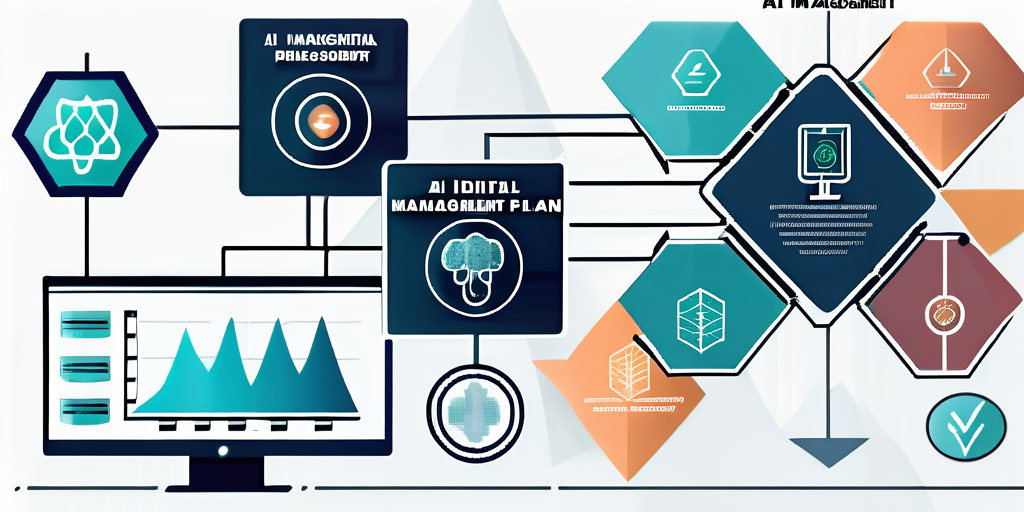In today’s rapidly evolving world of healthcare, it is crucial for clinics to have a robust risk management plan in place. With the advent of artificial intelligence (AI), clinics now have access to advanced tools and technologies that can greatly enhance their risk management strategies. In this article, we will explore the need for a risk management plan in a clinic setting and how AI can play a pivotal role in its development and implementation.
Understanding the need for a risk management plan in a clinic
A risk management plan is a comprehensive strategy designed to identify, assess, and mitigate potential risks that can impact the smooth functioning of a clinic. These risks can vary from medical errors and patient safety concerns to financial risks and regulatory compliance. A well-designed risk management plan helps clinics anticipate and proactively address potential challenges, ensuring the delivery of high-quality care and operational efficiency.
When considering the importance of a risk management plan in a clinic setting, it is crucial to acknowledge the dynamic nature of healthcare environments. Clinics are faced with a myriad of risks on a daily basis, ranging from clinical errors to data breaches and staff shortages. By implementing a robust risk management plan, clinics can not only protect themselves from potential liabilities but also enhance their overall resilience in the face of unforeseen circumstances.
The role of risk management in healthcare
Risk management in healthcare goes beyond simply minimizing the impact of incidents and accidents. It encompasses a proactive approach that focuses on preventing risks before they occur, identifying vulnerabilities, and implementing measures to address them. An effective risk management plan helps clinics protect their patients, employees, and reputation while ensuring compliance with regulatory requirements.
Moreover, a well-structured risk management framework can also contribute to fostering a culture of safety and continuous improvement within a clinic. By encouraging staff members to report near-misses and potential hazards, clinics can create a learning environment that promotes transparency and accountability, ultimately leading to better patient outcomes and staff satisfaction.
Identifying potential risks in a clinic setting
Before embarking on the development of a risk management plan, it is essential to identify and assess potential risks specific to your clinic’s operations. This can include risks related to patient safety, cybersecurity, financial management, human resources, and legal compliance. Conducting a thorough risk assessment will enable you to prioritize your efforts and allocate resources effectively.
Furthermore, involving key stakeholders such as clinicians, administrators, and support staff in the risk identification process can provide valuable insights into the day-to-day challenges faced by the clinic. By fostering a collaborative approach to risk management, clinics can leverage the collective expertise of their team members to develop targeted strategies that address the unique risks inherent in their operations.
Exploring the potential of AI in risk management
Artificial Intelligence has emerged as a game-changer in various industries, and healthcare is no exception. AI refers to the simulation of human intelligence in machines that are programmed to learn, reason, and perform tasks that typically require human intelligence. By leveraging AI technologies, clinics can revolutionize their risk management strategies and improve patient outcomes.
Artificial Intelligence, or AI, is a rapidly evolving field that holds immense promise for the healthcare sector. With its ability to process vast amounts of data and identify complex patterns, AI has the potential to transform the way clinics approach risk management. By harnessing the power of AI, clinics can proactively identify and mitigate risks, leading to better patient care and improved operational efficiency.
Defining AI and its capabilities
AI encompasses a range of technologies, including machine learning, natural language processing, and robotics, among others. These technologies enable machines to interpret data, identify patterns, make predictions, and automate tasks. By analyzing large volumes of healthcare data, AI can assist clinics in identifying potential risks, predicting adverse events, and suggesting appropriate preventive measures.
Machine learning, a subset of AI, allows systems to learn from data and improve their performance over time. This capability is particularly valuable in risk management, where the ability to adapt to new information and changing circumstances is crucial. Natural language processing, another key AI technology, enables machines to understand and generate human language, facilitating communication and data analysis in healthcare settings.
How AI can enhance risk management
The integration of AI into the risk management process can bring several benefits. Firstly, AI can help clinics identify patterns and trends in data that may otherwise go unnoticed, allowing for early detection and intervention. Secondly, AI-powered algorithms can provide real-time feedback on risks and suggest tailored risk mitigation strategies based on individual clinic profiles. Lastly, AI can automate routine tasks, freeing up valuable time for healthcare professionals to focus on patient care and strategic decision-making.
Robotics, a rapidly advancing field within AI, is also making waves in healthcare risk management. Robots equipped with AI capabilities can assist in surgeries, perform repetitive tasks with precision, and even deliver medication to patients. By incorporating robotics into their risk management strategies, clinics can enhance patient safety, improve efficiency, and reduce the likelihood of human error.
Steps to develop a risk management plan with AI support
Developing a risk management plan with AI support involves a systematic approach that takes into account the unique requirements of your clinic. By following these steps, you can create a comprehensive plan that effectively addresses your clinic’s specific risks.
Establishing your risk management team
Forming a dedicated risk management team is a crucial first step. This team should include key stakeholders from various departments, such as healthcare professionals, administrators, IT specialists, and legal experts. Collaboration and interdisciplinary expertise are essential in developing a plan that covers all aspects of the clinic’s operations.
Conducting a risk assessment with AI tools
An accurate and comprehensive risk assessment lays the foundation for a successful risk management plan. AI tools can analyze vast amounts of data from electronic health records, patient feedback, and other relevant sources to identify potential risks and their likelihood of occurrence. By using AI in the risk assessment process, clinics can better prioritize their efforts.
Developing risk management strategies with AI
Once potential risks are identified, the next step is to develop strategies to mitigate those risks. AI can provide valuable insights and recommendations based on historical data and predictive analytics. For example, AI algorithms can identify patterns of medication errors and suggest training programs for staff or propose process improvements to minimize the risks.
Furthermore, it is important to consider the ongoing monitoring and evaluation of the risk management plan. Regular reviews and updates are necessary to ensure the plan remains effective and relevant. AI can play a significant role in this process by continuously analyzing data and providing real-time feedback on the effectiveness of implemented strategies.
In addition, involving staff members in the risk management process is vital for its success. By fostering a culture of risk awareness and accountability, clinics can empower their employees to identify and report potential risks. This collaborative approach not only enhances patient safety but also promotes a positive and proactive work environment.
Implementing and monitoring your AI-supported risk management plan
Implementing a risk management plan with AI support requires effective communication, training, and coordination among all members of the clinic. It is crucial to ensure that staff members understand the plan and their respective roles in its implementation.
When implementing an AI-supported risk management plan, it is important to consider the ethical implications of using artificial intelligence in decision-making processes. Ensuring transparency and accountability in how AI algorithms are used to assess and mitigate risks is essential for maintaining trust among staff and patients.
Training staff on the new risk management plan
Training plays a vital role in the successful implementation of any risk management plan. The introduction of AI tools may require additional training for staff members to understand how to best utilise these technologies. Regular training sessions and ongoing support will enable staff members to confidently use AI tools and make informed decisions.
Furthermore, providing opportunities for staff to provide feedback on their training experiences and the usability of AI tools can help identify areas for improvement and ensure continuous learning and development within the clinic.
Monitoring and adjusting the plan with AI
Regular monitoring is essential to ensure the effectiveness of the risk management plan. AI can be leveraged to continuously collect and analyse data, providing real-time insights into potential risks and their impact. This allows for timely adjustments and refinements, ensuring the plan remains up-to-date and relevant.
Moreover, establishing key performance indicators (KPIs) and metrics to measure the success of the AI-supported risk management plan is crucial for evaluating its impact on patient safety and overall clinic operations. By regularly reviewing and analysing these metrics, clinic management can make data-driven decisions to further enhance the effectiveness of the risk management plan.
Evaluating the effectiveness of your AI-supported risk management plan
Measuring the success of your risk management plan with AI involves establishing key performance indicators (KPIs) to assess the plan’s impact on patient outcomes, operational efficiency, and financial stability. By tracking these KPIs, clinics can evaluate the effectiveness of their risk management strategies and make data-driven improvements.
When evaluating the effectiveness of an AI-supported risk management plan, it is crucial to consider the ethical implications of using artificial intelligence in healthcare. Ensuring that patient data is protected, maintaining transparency in decision-making processes, and addressing any biases in the AI algorithms are essential factors to uphold ethical standards in risk management.
Continuous improvement of your risk management plan with AI
AI-enabled risk management is a continuous process. As technology advances and new risks emerge, it is essential to stay informed and adapt the risk management plan accordingly. Ongoing collaboration with AI experts, sharing of best practices, and regular data analysis will enable clinics to stay ahead of potential risks and continuously improve their risk management strategies.
Furthermore, integrating AI into risk management can also enhance the overall quality of patient care. By leveraging AI algorithms to predict and prevent potential risks, healthcare providers can proactively address issues before they escalate, leading to improved patient outcomes and satisfaction levels. This proactive approach not only benefits patients but also contributes to the overall efficiency and effectiveness of healthcare operations.
Overcoming challenges in implementing AI-supported risk management
While AI offers tremendous potential in risk management, there are challenges that clinics may encounter during implementation.
Implementing AI in risk management within healthcare settings can be a transformative process, revolutionising the way data is analysed and risks are identified. However, this transition is not without its hurdles, and healthcare providers must navigate through various obstacles to fully harness the benefits of AI technology.
Addressing common obstacles in AI implementation
Some common challenges include resistance to change, lack of trust in AI systems, and concerns about data privacy and security. Overcoming these challenges requires effective change management strategies, comprehensive training programs, and robust data protection measures to ensure patient confidentiality and data integrity.
Resistance to change is a natural response when introducing new technologies, especially in healthcare where patient safety is of utmost importance. Addressing this resistance involves clear communication about the benefits of AI in risk management, involving stakeholders in the decision-making process, and providing continuous support and training to staff members.
Ensuring data privacy and security in AI applications
Data privacy and security are paramount in healthcare. Clinics must ensure that AI systems comply with regulatory requirements, have appropriate data encryption mechanisms in place, and follow best practices for data storage and access control. Collaborating with experienced digital marketing agencies focused on healthcare marketing can help clinics navigate these complexities.
Furthermore, healthcare providers must stay abreast of evolving data protection regulations and ensure that their AI systems are regularly updated to meet compliance standards. This proactive approach not only safeguards patient information but also enhances the overall trust in AI technology within the healthcare industry.
The future of AI in risk management in clinics
The use of AI in risk management is set to become even more prevalent in the future, as technology continues to advance and healthcare organizations recognize its potential.
Artificial Intelligence (AI) has already made significant strides in revolutionizing various industries, and the healthcare sector is no exception. With its ability to process vast amounts of data and identify patterns, AI is poised to play a crucial role in risk management in clinics. By leveraging AI technologies, clinics can enhance their ability to identify, assess, and mitigate potential risks, ultimately leading to improved patient care and outcomes.
Emerging trends in AI for risk management
Emerging trends in AI for risk management in clinics are both exciting and promising. One such trend is the use of predictive analytics, which enables healthcare providers to identify risks before they occur. By analyzing historical data and patterns, AI algorithms can predict potential risks, allowing clinics to take proactive measures to prevent adverse events.
Another emerging trend is the application of natural language processing (NLP) in analyzing unstructured healthcare data. NLP algorithms can extract valuable insights from clinical notes, research papers, and patient records, enabling clinics to identify hidden risks and improve decision-making processes.
Furthermore, robotic process automation (RPA) is gaining traction in clinics for streamlining administrative tasks. RPA technology can automate repetitive and time-consuming processes, such as data entry and appointment scheduling, freeing up healthcare professionals to focus on more critical aspects of patient care.
Preparing for the future of AI in healthcare risk management
Preparing for the future of AI in healthcare risk management requires a proactive approach. Clinics should stay informed about the latest technological developments and advancements in AI. This can be achieved through attending conferences, workshops, and collaborating with AI experts and researchers.
Moreover, clinics should actively seek partnerships with AI companies and explore opportunities for collaboration. By working closely with AI experts, clinics can gain valuable insights and guidance on how to effectively integrate AI into their risk management strategies.
Continuous evaluation and updating of risk management plans are also crucial in leveraging the full potential of AI. As AI technologies evolve, clinics need to adapt their strategies accordingly. Regular assessments of AI systems’ performance, data quality, and ethical considerations will ensure that clinics can effectively harness the power of AI in risk management.
In conclusion, developing a risk management plan with AI support is vital for clinics to ensure the delivery of safe and high-quality care. By harnessing the power of AI, clinics can proactively identify and mitigate potential risks, improve patient outcomes, and enhance operational efficiency. Collaboration with AI experts and digital marketing agencies focused on healthcare marketing can provide valuable guidance and support in successfully implementing AI-driven risk management strategies. Embracing AI in risk management will undoubtedly shape the future of healthcare, making it more intelligent, efficient, and safe.
As we navigate the complexities of healthcare risk management, the integration of AI becomes not just an option, but a necessity for forward-thinking clinics. At Clinic Marketing AI, under the leadership of Angelo Rosati, we understand the intersection of healthcare, marketing, and artificial intelligence like no other. With a commitment to excellence and a proven track record in health tech, we’re here to be more than just a service provider; we’re here to be your partner in growth. If you’re ready to harness the power of AI and elevate your clinic’s risk management plan, Book a Call with Us today. Let’s transform the future of Your Clinic together.




